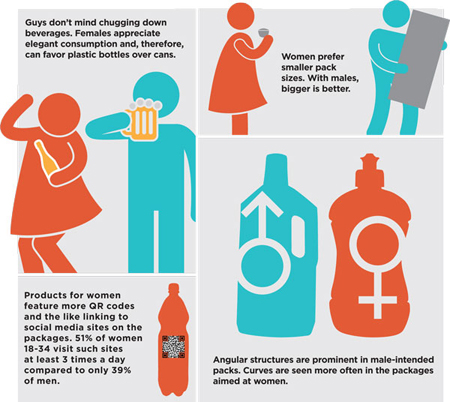With the way people are responding to the latest Gillette ad, anyone would think “toxic masculinity” was a new term coined to shame men. Gillette isn’t the first men’s brand to redefine its image, a process that actually started months before the world went crazy this week over the shaving company’s new ad.
from news.com.au - (https://www.news.com.au/lifestyle/beauty/for-men/why-mens-brands-tackling-toxic-masculinity-is-nothing-new/news-story/5ffadfa7859513b18883a2b09cc46f20)
Coming from the perspective of Advertising & Branding, one of the basics in profiling your target market in a creative brief, is to define their demographic points to make assumptions.
One critical factor is Gender. We see it in the marketplace display all the time, black & sporty designs for men, pink and floral miniatures for women.
The industrial revolution created mass production of the same items, first, packaging was designed with a focus to highlight benefits of the products.
Later, sales tactics took advantage of 'assumptive selling', presenting a generic product as a pre-customised product to potential buyers, that had a higher chance of being purchased because it inferred an impression of ownership, as well as offering an ego boost that their personal biodata has already been considered by the seller.
Mass production & repeat sales, over time, created Brands, huge organisations with tools like Marketing & Advertising, that exists to intentionally influence buying behaviour and culture.
In turn, this became 'Consumer Culture', leaking gender role stereotypes into prepubescent minds that had not defined what it means to be filled with Testosterone or Estrogen yet.
TOXIC MASCULINITY
Click here for Wikipedia's take on Toxic Masculinity
I personally like the one from UrbanDictionary:
A social science term that describes narrow repressive type of ideas about the male gender role, that defines masculinity as exaggerated masculine traits like being violent, unemotional, sexually aggressive, and so forth. Also suggests that men who act too emotional or maybe aren’t violent enough or don’t do all of the things that “real men” do, can get their “man card” taken away.
I have a deep personal interest in looking at the differences of gender psychology, ever since I read the book - Why Men Lie & Women Cry by Allan & Barbara Pease, which highlighted the hilarious result of two fundamentally different frameworks of thought, tackling daily life as a couple, in work or in marriage.
I do not subscribe to a gender category in general, but I suppose I fall into the LGBTIQ camp. Which allowed me to not feel shoved into a specific point of view, perhaps even enabling myself to feel strongly for both the Male and Female perspectives, looking at each with more understanding and empathy than most.
Masculinity itself is not toxic, but rather the need to diminish or dominate that which does not align with their concept of masculinity, that is the issue. It is the desire to eliminate minorities that causes harm to society in general.
Arguably the Elites, VIPs, Religious Radicals, Terrorists, Cults and other types of exclusive sects exhibit the same form of aggressive, non-inclusive modus operandi.
Therefore the profiling of selling to gender stereotypes would be better viewed through a more inclusive spectrum, one that discusses the complementary aspects of gender, rather than the competitive parts.
Lastly, I also think audience groups that attacked the ad's message are also interpreting it through their own biased and exclusive interpretations.
A worthwhile campaign message might be to direct the audience to be more self-aware, less reactive & more pensive of the stereotypes they are being sold.
Like the Olympics, we should adopt sportsmanship, the view that praises a winning attitude without the need of eliminating/belittling their competitor, but instead, embrace their differences and encourage a better performance for both sides next time around.


Comments
Post a Comment
Thanks for the OMG!s